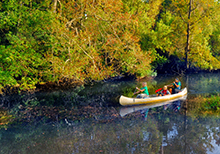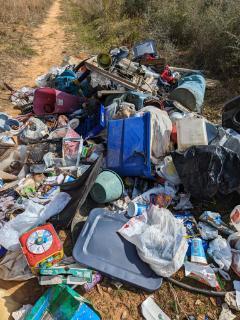Stormwater Program
Stormwater program and information.
Stormwater is surface runoff primarily from rainwater or overwatering that runs off roads, yards and roofs. Stormwater frequently carries pollutants such as trash, automobile fluids, nutrients, sediments and animal waste. Stormwater is carried to storm drains, ditches and pipes then discharged, to streams, rivers and bayous. Stormwater at UWF is regulated by NPDES.

University of West Florida has a variety of streams, rivers, and wetlands that are used for recreational enjoyment, sustaining ecosystems, filtering, storing, controlling stormwater, and recharging groundwater. These surface waters are part of what makes Northwest Florida such a unique place to live. Most of the surface waters are replenished by stormwater, which is an excellent solvent that picks up, dissolves, and carries a wide variety of materials including heavy metals, solvents, soaps, sewage, pesticides, herbicides, waste oils, and large amounts of suspended solids commonly called turbidity. These contaminants, along with improperly controlled development, degrade water quality, diminish recreational use, pose risks to human, plant, and animal populations, and cause flooding. The control of pollution in stormwater discharge is critical to protecting the quality of surface waters, and is of growing concern as our developed areas increase. In populated areas, stormwater flows along yards and paved surfaces to a man-made system of ditches, curbs, pipes, and retention ponds eventually discharging into natural surface waters. To protect surface waters within the university, the Environmental Health and Safety Department (EH&S) has been delegated the responsibility of enforcing requirements of the National Pollutant Discharge Elimination System (NPDES) relating to stormwater within its jurisdiction.
What is NPDES?
NPDES stands for National Pollutant Discharge Elimination System. This a regulatory program developed by the U.S. Environmental Protection Agency to reduce or eliminate the discharge of pollutants to water of the United States. UWF is regulated by Phase II of the NPDES. Phase II has 6 requirements:
- Public education and outreach
- Public involvement/participation
- Illicit discharge detection and elimination
- Construction site stormwater runoff control
- Post-construction stormwater management
- Pollution prevention/good housekeeping
What is an Illicit Discharge?
Illicit discharge is any discharge to roadway, drainage ditch, street, gutters or storm drain that is not comprised of stormwater. Examples of illicit discharges are liter, yard clippings, pet waste, oil and grease from automobiles, pesticides and fertilizers, sand and dirt from erosion.
You can help UWF identify sources of water pollution that affect our campus streams. If you see unusually colored water, smell sewage or other chemical odors, see soap suds in storm drain inlets or in campus streams please call EH&S office at 850.474.2525 or fill the UWF Illicit Discharge Reporting Form .

What you can do to prevent illicit discharges on UWF campus?
- Pick up trash and dispose of properly
- Pick up pet waste and dispose of properly
- Don’t dump mop water, oil, grease, hazardous waste, solvents, paints outside or in stormdrains or waterbodies
- Do not wash vehicles by hand use the wash rack located near Building 93
UWF Illicit Discharge Reporting Form
UWF Campus Map of Stormwater System (pdf)
Student Organizations
The UWF Student Environmental Action Society (SEAS) organization is committed to educating students, businesses. and citizens about the importance of environmental awareness and natural resource conservation.
Instagram: @uwfseas
Facebook: UWF SEAS


